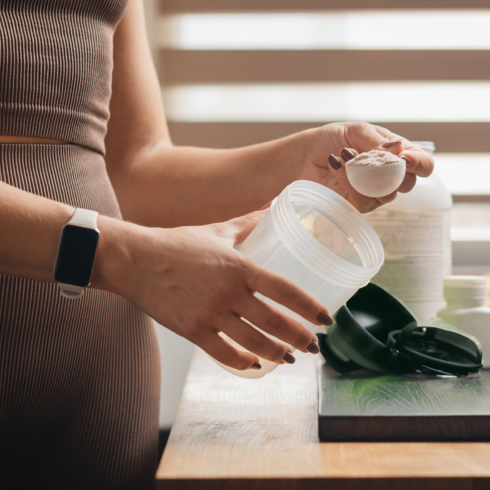Everything you need to know about creatine !
Creatine is not just a "magic pill" for athletes. Studies have shown that it can improve cognitive performance, aid muscle recovery and even support heart health. Yes, it really can be an asset to you, whether you're a top sportsperson or someone just looking to optimise their general wellbeing.
Summary.
- What is creatine?
- How to take creatine?
- Is creatine safe?
- What are the side effects of creatine?
- Is creatine good for bodybuilding?
- Does creatine make you gain weight?
- Is taking creatine with sugar necessary for effectiveness?
- What is the best time of day to take creatine?
- Does creatine require a loading phase?
- What is the best form of creatine?
- Can you mix creatine with protein?
- Coach's tips.
How to take creatine ?
Taking creatine isn't complicated, but there are a few guidelines you should follow to maximise its benefits. Firstly, you have several options when it comes to the form of creatine you choose. Creatine monohydrate is the most widely studied and most commonly used. Next, let's talk about the 'loading phase'. For the first 5 to 7 days, you can take around 20g of creatine a day, divided into 4 doses of 5g. This phase is not compulsory, but it allows you to saturate your muscles quickly with creatine. After this phase, a maintenance dose of 3 to 5g a day is sufficient.
There's also the ideal time to take creatine. Some people prefer to do it before training to maximise energy, while others do it afterwards to aid recovery. The truth is, it doesn't really matter when, as long as you take your daily dose. Remember, as with any supplement, to consult a healthcare professional before starting a new supplementation regime, especially if you have pre-existing medical conditions or are taking other medications. Creatine is there to give you that little extra boost, to push you beyond your limits. And when you combine it with the right exercises and a healthy diet, you can really see noticeable progress.
Duration of a cure.
The length of a creatine course can vary. Some recommend 8-week cycles with a 4-week break, others advocate 12-week cures with a 12-week break, while others suggest that creatine can be taken continuously, especially if you train intensely. Various studies have been carried out on the subject with often differing results.
Is creatine safe ?
The question of creatine safety is a much-discussed topic in the world of sport and nutrition. So, is it safe? The short answer: in general, yes, but there are nuances to consider.
What the latest studies say.
Recent research indicates that creatine is generally safe when taken at recommended doses. A meta-analysis published in 2021 concluded that creatine had no significant adverse effects on kidney and liver function in healthy individuals. However, it is advisable to consult a healthcare professional before starting creatine supplementation, especially if you have pre-existing health problems: as with any supplement, there are a few precautions to take.
Creatine is one of the most researched supplements on the market and is generally considered safe for most people when used correctly. But as always, it's crucial to be informed and make informed decisions.
Points to consider.
Hydration.
Creatine can increase water retention, so it's crucial to stay well hydrated.
Drug interactions.
it's always a good idea to consult a healthcare professional before starting creatine, especially if you have pre-existing medical conditions or are taking other medications.
Kidney or liver problems.
if you have kidney or liver problems, creatine may not be ideal for you. It can increase creatinine, a metabolic waste product, which can be a problem for those who already have kidney problems.
In summary, creatine is one of the most researched supplements on the market and is generally considered safe for most people when used correctly. But as always, it's crucial to be informed and make informed decisions.
Creatine can be a powerful tool to help you unlock your full potential. But remember, the key is to use it responsibly and always in consultation with a healthcare professional.
What are the side effects of creatine ?
Creatine is one of the most studied supplements and generally considered safe for most people when taken at recommended doses. However, as with any supplement, there are potential side effects to consider.
Common side effects.
- Water retention: Creatine may cause water retention, which may increase body weight
- Muscle cramps: Some users report muscle cramps, although scientific evidence is limited
- Gastrointestinal problems: High doses may cause stomach upset, diarrhea or nausea.
Less common side effects.
- Renal function:There have been concerns about the effect of creatine on kidney function, but most studies have not found strong evidence to support this.
- Drug interactions:Creatine may interact with certain medications, including diuretics and diabetes medications.
- Consult a healthcare professional:Creatine is a powerful tool for improving sports performance and muscle recovery, but as with everything, it's essential to use it wisely. Before starting a creatine supplementation regime, it's always a good idea to consult a healthcare professional, especially if you have any pre-existing medical conditions or are taking any other medications.
Is creatine good for bodybuilding ?
Creatine is a very popular supplement in the bodybuilding world, and for good reason. Here's what studies and experts say on the subject:
How does creatine work ?
Creatine is a combination of three different amino acids: glycine, arginine and methionine. Once in the body, creatine binds to a phosphate molecule to form creatine phosphate. Creatine phosphate plays a crucial role in the regeneration of ATP (adenosine triphosphate), the main source of cellular energy. By increasing ATP reserves, creatine makes it possible to train harder and longer.
Benefits for bodybuilding :
- Increased muscle strength: Creatine can increase muscle strength, which is particularly beneficial for explosive and high-intensity exercise.
- Better recovery: Creatine helps you recover more quickly between sets, allowing you to train more intensely and effectively.
- Cell hydration: Creatine has the ability to hydrate muscle cells, which can increase protein synthesis and give muscles a more 'pumped up' appearance.
- Other benefits: In addition to the muscle-building benefits, creatine can also improve brain performance, glucose metabolism and bone mineral density.
Dosage and timing.
There are two common methods of taking creatine: the loading phase and low-dose daily supplementation. The loading phase involves taking 20-25 grams a day for 5-7 days, followed by a maintenance dose of 3-5 grams a day. Low-dose daily supplementation simply involves taking 3-5 grams of creatine every day
.
Creatine is an extremely effective supplement for bodybuilding. It can increase strength, improve recovery and even offer benefits beyond the gym. As always, it is recommended that you consult a healthcare professional before starting any supplementation regime.
Does creatine make you gain weight ?
The question of whether creatine makes you put on weight is a topic frequently discussed, especially by those looking to optimise their physique. Here's what the studies and experts say:
Types of weight gain associated with creatine
- Water weight: Creatine can cause rapid weight gain due to water retention. The supplement draws water into muscle cells, which can lead to a swollen or puffy appearance around the arms, legs or abdomen. In the first week of taking oral creatine, some people can gain around 2 to 4.5 pounds, mainly due to water retention.
- Muscle mass: Despite gaining water weight, research has shown that creatine can be an effective supplement for increasing endurance and strength. Over time, you could see an increase in muscle size and strength.
- Non-muscle weight: There may be concerns about non-muscle weight gain, such as fat. However, creatine won't make you fat in terms of fat. To gain fat, you need to consume more calories than you expend. One dose of creatine (around 5 grams) has no calories or very few1. However, creatine intake must be integrated into a suitable diet to avoid taking in more calories than necessary. Although creatine is best taken when building muscle mass, you can't build muscle mass without gaining a little fat. So be careful not to increase your calorie intake too much. You can also increase your calorie expenditure.
Creatine can indeed cause weight gain, but this weight gain is usually due to increased muscle mass and water retention, rather than fat accumulation. If you're looking to maximise muscle gains while minimising fat gain, creatine can be a valuable tool in your bodybuilding toolbox.
Is taking creatine with sugar necessary for effectiveness ?
The question of whether taking creatine with sugar is necessary to maximise its effectiveness is a subject of debate in the world of sports nutrition. Here's what the studies and experts say:
The theory behind taking creatine with sugar.
The idea of taking creatine with sugar (dextrose) is based on the concept that sugar can cause a release of insulin, acting as a "creatine pump" for better absorption. This idea has become quite popular in the supplement industry.
What the studies say :
- Some studies have shown that a drink containing 93g of simple sugars consumed 30 minutes after ingesting 5g of creatine, 4 times a day, was effective in potentiating insulin release and creatine retention. According to other studies, taking creatine with carbohydrates does not alter the efficacy of creatine. In fact, it could even be detrimental. This is why taking sugars is controversial.
- Improved absorption: Yet other studies have shown that ingesting a carbohydrate source such as sugar during or immediately after taking creatine significantly improves creatine absorption rates. This is due to the release of insulin, which helps transport nutrients through the body, including creatine.
The effect of insulin.
- Insulin surge: Adding dextrose (a type of quick sugar) to your creatine can cause an insulin surge. This insulin surge is thought to act as a 'creatine pump', helping to improve the absorption of creatine into the muscles.
- Too many calories: However, a clinical study from the 90s suggested that adding sugar provided too many total calories and recommended using grape juice instead. Taking creatine with a large amount of sugar can significantly increase calorie intake, which could lead to unwanted weight gain.
Other options: If you're looking to maximise creatine absorption without using sugar, alternatives such as more complex carbohydrates can be considered, absorbed as quickly as sugar, but which are starches and not sugar.
The idea of taking creatine with fast sugars is not unfounded. Sugar can actually help improve creatine absorption in the muscles thanks to a surge in insulin. However, this method can also have drawbacks, such as unwanted weight gain. As always, the important thing is to find what works best for you.
What is the best time of day to take creatine ? Before or after exercise ?
The question of the optimal timing for creatine intake is a subject of great interest to athletes and fitness enthusiasts. Here's what the studies and experts say:
Timing options.
- Before exercise: The argument for taking creatine before a workout is based on the idea that more creatine equals more ATP, the main source of cellular energy. More ATP means more power available to the muscles.
- After exercise: The argument for taking creatine after a workout often focuses on how your muscles are depleted of nutrients after a workout and are therefore "ready" for a large influx of nutrients.
- Anytime: Some experts suggest that the timing of creatine intake is not as crucial as taking the supplement regularly.
What the studies say.
- A study examined whether it was more effective for adult men to consume five grams of creatine before or after exercise. At the end of the study, greater increases in lean body mass and strength were observed in the group that took creatine after exercise.
- However, other research reported no difference between taking creatine before or after exercise.
- A 10-week study provided a dietary supplement containing creatine, carbohydrates and protein to adults who were weight training. The group that took the supplement at a time close to exercise gained more muscle and strength than the group that took the supplement in the morning and evening.
The best time to take creatine is not entirely clear, but it is probably beneficial to take it close to exercise. That said, the most important thing is to take creatine regularly to see the benefits.
Does creatine require a loading phase ?
The creatine loading phase is a subject that generates a lot of discussion in the fitness and bodybuilding world. Here's what the experts and scientific studies say on the subject:
What is the creatine loading phase ?
The creatine loading phase involves taking more creatine than the maintenance dose for several days. The aim of this method is to quickly saturate muscle creatine stores. A typical loading phase could involve consuming 20g of creatine per day (5g x 4) for 5 to 7 days.
Advantages of the charging phase.
- Faster training gains: The loading phase rapidly optimises creatine stores, which can lead to faster training gains and improved performance.
- Proven effectiveness: Research shows that this method can effectively increase creatine stores by 10-40%.
Is this necessary ?
- Not necessarily: Although the loading phase can saturate creatine stores quickly, lower doses of creatine taken once a day can be just as effective, although it may take a little longer.
- Other methods: For example, one study found that muscles were completely saturated after people took 3 grams of creatine a day for 28 days.
The creatine loading phase can be an effective way of rapidly maximising creatine stores in the body, but it is not strictly necessary. Lower doses taken regularly can also be effective, although this may take longer.
What is the best form of creatine ?
Choosing the best form of creatine can be a challenge, especially with the variety of products available on the market. Here's what the experts and scientific studies say:
Types of creatine.
- Creatine Monohydrate: This is the most studied and commonly used form. It is generally considered safe and effective for increasing strength and muscle mass.
- Micronised Creatine: This is a form of creatine monohydrate that has been micronised, meaning the particles are smaller and therefore easier to dissolve in water.
- Creatine Ethyl Ester: This form is designed to pass through cell membranes more easily, but studies have not shown it to be more effective than creatine monohydrate.
- Creatine HCL: This form is water-soluble and may be easier to digest for some people.
- Creatine Alkaline: This form is buffered to resist stomach acid, although studies have not shown it to be more effective than creatine monohydrate.
- Creatine Anhydrous: This variant is almost identical to creatine monohydrate, but is richer in creatine, containing 95% pure creatine.
- Creatine Magnesium: The addition of magnesium, a microelement, to this form of creatine helps to protect it in the stomach, which improves its assimilation.
- Creatine Phosphate: Although it is formulated with phosphate to outperform standard creatine, this claim has never been scientifically validated. It has a concentration of 60% pure creatine.
- Creatine Malate: This version combines with malic acid, a component involved in energy production at cellular level.
What the studies say.
- The majority of studies have used creatine monohydrate and found it to be effective in increasing strength and muscle mass.
- Other forms, such as creatine ethyl ester, have not shown any additional benefits over creatine monohydrate.
Creatine monohydrate remains the most studied and recommended form for most people. Other forms may offer specific benefits, but they are generally no more effective than creatine monohydrate.
Can you mix creatine with protein ?
The question of whether creatine can be mixed with protein is frequently asked, especially by those looking to maximise muscle gains. Here's what the experts and scientific studies say on the subject:
Creatine and protein synergy.
- Complementarity: Creatine and protein are highly complementary. Creatine is mainly used to improve performance in high-intensity, short-duration exercise, while protein is es-sential for recovery and muscle growth.
- No contraindications: According to experts, there is no negative interaction between creatine and protein. On the contrary, their combination can be beneficial for recovery and performance in endurance sports as well as for bodybuilding.
When should they be taken ?
- At the same time: Some experts suggest that taking creatine with protein can be beneficial, especially if you eat a varied and balanced diet and engage in regular intense physical activity.
- Separately: Others recommend taking them at different times to maximise their respective absorption. For example, creatine can be taken before training to improve performance, while protein can be taken afterwards to aid recovery.
Yes, you can absolutely mix creatine with protein. Not only is there no contraindication, but their combination can even be synergistic, improving both performance and recovery.
Coach's tips.

- Creatine appears to be a very effective supplement for boosting your training. When you need to boost your training, it's the ideal product.
- Don't hesitate to test the stimulating effect of creatine with QNT's creatine monohydrate. It can be found in a few specific products such as pre workout pump rx or Hydravol but also in various forms such as tablets or powder300 g or 800 g
- In general, a good course of creatine can last 3 months with no intake, then a 3-month break. But everyone can try different ways, as there seem to be significant differences from one person to another.
Yves Bondroit Coach for QNT.
Related posts
-
 Why take turmeric?
Posted in: Food supplements25/10/2021There are hundreds and hundreds of spices with different properties and turmeric is obviously one of them! It is a...Read more
Why take turmeric?
Posted in: Food supplements25/10/2021There are hundreds and hundreds of spices with different properties and turmeric is obviously one of them! It is a...Read more -
 With or without supplements?
Posted in: Food supplements07/09/2021Now that we have laid the background for getting started, let's focus a little more on some details.Read more
With or without supplements?
Posted in: Food supplements07/09/2021Now that we have laid the background for getting started, let's focus a little more on some details.Read more -
 Which foods boost testosterone levels ?
Posted in: Food supplements07/05/2021Testosterone, often associated with virility, has much more to offer than you might think. It plays a crucial role in...Read more
Which foods boost testosterone levels ?
Posted in: Food supplements07/05/2021Testosterone, often associated with virility, has much more to offer than you might think. It plays a crucial role in...Read more -
 AAKG OR HMB: what are the differences?
Posted in: Food supplements24/04/2021There are many dietary supplements and some are better known than others. It is important not to get lost among these...Read more
AAKG OR HMB: what are the differences?
Posted in: Food supplements24/04/2021There are many dietary supplements and some are better known than others. It is important not to get lost among these...Read more -
 Why should I take L-Carnitine?
Posted in: Food supplements19/04/2021Towards the end of the twentieth century, L-carnitine was recognized for its various benefits. Indeed, it is during...Read more
Why should I take L-Carnitine?
Posted in: Food supplements19/04/2021Towards the end of the twentieth century, L-carnitine was recognized for its various benefits. Indeed, it is during...Read more
Blog categories
Popular posts
-
 10 Expert Tips to Maximize the Effectiveness of Creatine26/08/2024Posted in: Our tipsThis article presents ten tips to maximize the effectiveness of creatine. It emphasizes the importance of choosing...Read more
10 Expert Tips to Maximize the Effectiveness of Creatine26/08/2024Posted in: Our tipsThis article presents ten tips to maximize the effectiveness of creatine. It emphasizes the importance of choosing...Read more -
 Looking thinner but at a heavier weight? Is that possible?04/10/2021Posted in: Our tipsAdvertising has shaped our thinking! We have been forced for years to believe that losing weight is the key to having...Read more
Looking thinner but at a heavier weight? Is that possible?04/10/2021Posted in: Our tipsAdvertising has shaped our thinking! We have been forced for years to believe that losing weight is the key to having...Read more -
 10 BENEFITS OF GLUTAMINE.02/01/2024Posted in: Our tipsDiscover the power of L-glutamine, an underrated superhero in the world of amino acids! Essential for revitalizing...Read more
10 BENEFITS OF GLUTAMINE.02/01/2024Posted in: Our tipsDiscover the power of L-glutamine, an underrated superhero in the world of amino acids! Essential for revitalizing...Read more -
 L-carnitine and weight loss.15/10/2024Posted in: Our tipsDiscover how carnitine works on weight loss, even without exercise. This article reveals whether this supplement can...Read more
L-carnitine and weight loss.15/10/2024Posted in: Our tipsDiscover how carnitine works on weight loss, even without exercise. This article reveals whether this supplement can...Read more -
 Proteins for weight loss !29/12/2023Posted in: Our tipsDive into the fascinating world of proteins and their key role in weight loss. Discover how to choose the best...Read more
Proteins for weight loss !29/12/2023Posted in: Our tipsDive into the fascinating world of proteins and their key role in weight loss. Discover how to choose the best...Read more




